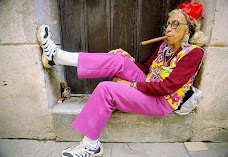
Well, Doc didn't get (or didn't appreciate) the use of humor in the previous post regarding genocide and America and Thanksgiving. In case he's not alone, I offer a brief explanation before expounding on the role of the jester:
Perhaps because I am supposedly between one-eighth and three-eighths Native American, my thoughts always turn at Thanksgiving to America's shamefully violent actions against the native population. So, the fact that most modern Americans (in my experience) mutter grateful prayers to a Christian deity for their bountiful lives and for the many blessings heaped upon them simply because they won the geographic and genetic lottery is offensive.
I guess the gratitude itself isn't offensive; rather it is the the fact that so many people take the time to recognize their blessings without an iota of thought (better yet: a moment of silence) given to the Native Americans we slaughtered and who still suffer more than any other group at our expense. So, that thought entered my head as a kind of fantasy I'd like to have expressed - had I been asked to "say grace" this Thanksgiving. Gratefully, no ritualistic practices of holding hands and saying prayers were forced upon me this year during the family gathering...
...which brings me to the Joker: his or her influence in history and in policy-making is under-appreciated. The jester's role in ancient China through the monarchies of Europe to the comedic artists of today has been to point out the flaws and dark underbellies of policy-making and culture. A criticism that might not be heard or otherwise heeded (or that might result in the beheading or imprisonment of a commoner) was allowed by the Fool. Today, writers and other artists ("The Daily Show with Jon Stewart" or the roasting of the President during the annual White House Correspondents' Association Dinner) are the descendants of this fine tradition of social criticism.
"The foolishness of the jester, whether in his odd appearance or his levity, implies that he is not passing judgment from on high, and this may be less galling than the "holier than thou" corrective of an earnest adviser. One of the most effective techniques the jester uses to point out his master's folly is allowing him to see it for himself. Rather than contradicting the king, the jester will agree with a harebrained scheme so wholeheartedly that the suggestion is taken to a logical extreme, highlighting its stupidity. The king can then decide for himself that maybe it wasn't such a good idea after all." [Excerpt from "Fools Are Everywhere" a book by Beatrice K. Otto]
So, what do you think? Is humor an effective tool for social criticism? Are there topics too horrible for the use of humor? Is anything too taboo for the foo' ? What instances of artistic cultural criticism (comedic or not) have made you squirm?
Movie scenes I can think of include "Borat" (and any interview D Ali G conducts - that shit leaves me laughing and squirming like a whore teaching Sunday school), the scene in "American Beauty" when it looks like Spacey just might bang the teenage Thora Birch, and the twisted humor of comedic violence in "Pulp Fiction."
I know it's a subjective call - but I'd like your thoughts/experiences/perspectives.
What have you got for the Curmudgeonly Fool?








